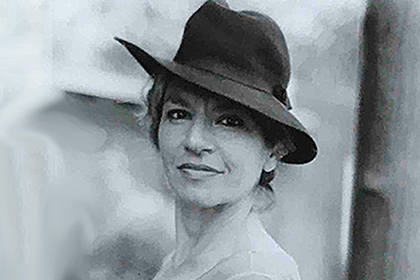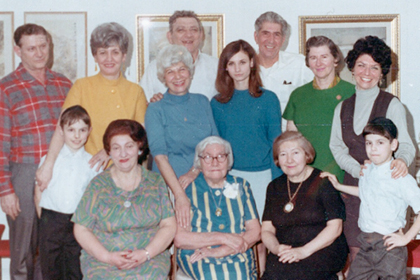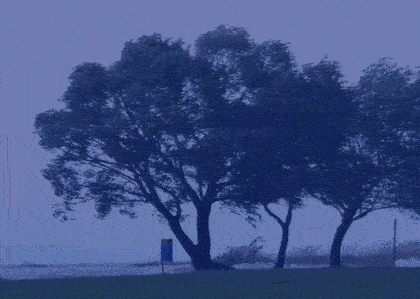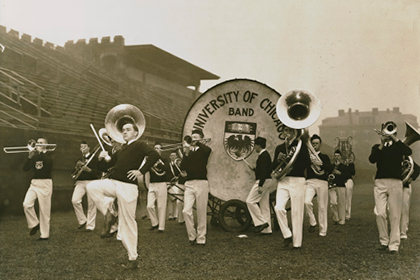|
|
|
Themistocles, Thucydides,
The Peloponnesian War,
X squared, Y squared,
H2SO4.
Who for? What for?
Who we gonna yell for?
GO, MAROONS!
|
|
|
| |
--Alleged UChicago cheer* |
|
|
|
| |
|
|
|
|
|
|
|
|
|
|
|
| Bette Howland, the genius we forgot |
|
| |
|
|
|
| Bette Howland, AB'55, in an undated photo. |
|
| |
|
| The book with the odd title W-3 was in the bargain bin, priced at one dollar. |
|
| |
|
| Brigid Hughes fished it out, attracted by "this fabulous 1970s cover with this big neon green symbol." On the back: a blurb from Saul Bellow, EX'39. She bought it. |
|
| |
|
| Hughes--the second editor of the Paris Review after George Plimpton and founder of the literary magazine A Public Space--had never heard of the author, Bette Howland, AB'55. W-3 (Viking, 1974), turned out to be Howland's first book, a lightly fictionalized memoir of her stay in the University of Chicago's psychiatric ward. |
|
| |
|
| Online, there was almost nothing about Howland. Eventually Hughes tracked down her son Jacob, a philosophy professor at the University of Tulsa in Oklahoma. Bette Howland was still alive, he confirmed, but suffering from dementia. |
|
| |
|
| In 2015, with Jacob's help, A Public Space published a portfolio of Howland's work: two short stories, an essay, and excerpts from postcards and letters that Bellow, her friend and mentor, had sent her over decades. Jacob told his mother all about it. She was "mildly pleased," he says. Howland died in 2017. |
|
| |
|
|
|
| Howland (far right) with Jacob (also far right), older son Frank (left), and members of her extended family, who were frequent subjects of her autobiographical work. |
|
| |
|
| This year A Public Space Books published Calm Sea and Prosperous Voyage, a collection of Howland's stories. Now articles and reviews are everywhere: the Paris Review, the New York Times, Harper's, Lithub, even the Wall Street Journal. |
|
| |
|
| But Howland's reviews were always good. When her second book, Blue in Chicago (Harper & Row, 1978) was published, Studs Terkel, PhB'32, JD'34, called her "one of the most perceptive observers of a city, Chicago." The New York Times described her third and final book, Things to Come and Go (Knopf, 1983), as "a quirky collection of three long stories by a writer of unusual talent, power, and intelligence," just like "the brilliantly executed Blue in Chicago." |
|
| |
|
| How did a writer with such a prestigious pedigree--an MFA from the University of Iowa in 1967, a Guggenheim Fellowship in 1978, a MacArthur Foundation "genius grant" in 1984--come to be so thoroughly forgotten? |
|
| |
|
| Read more about Howland in the University of Chicago Magazine. |
|
| |
|
|
|
| Guitarist Eli Winter has no words |
|
| |
|
|
|
| |
| |
“ |
|
| |
Every so often somebody comes up to me after a show and says, 'Hey, you should try putting words in your songs next time.' I sing when I want to; I just haven't wanted to. It's nice to have the meaning out of my hands. |
|
| |
--Guitarist and creative writing major Eli Winter, Class of 2020 |
|
|
|
| |
|
| Hear songs from Winter's debut album The Time to Come (Blue Hole Recordings, 2019), available as a digital recording and limited-edition cassette. |
|
| |
|
| Read more about Winter in the next issue of the Core, out in February 2020. |
|
| |
|
|
|
| Fake algae trees and other solutions |
|
| |
|
|
|
| On the last day of Orientation Week, teams of first-years competed to come up with the most creative response to climate change. |
|
| |
|
| The team Ad Astra proposed installing "algae trees"--tree-shaped, bioluminescent bioreactors--as part of UChicago's botanic garden. Their idea won the MADD (Media Arts, Data, and Design) Scientist Award for best speculative design. |
|
| |
|
|
|
| Team Ouroboros took home the Smarty Pants Award for the most detailed and highly probable pitch: a system for sanitizing and reusing takeout containers. |
|
| |
|
| Team Nudged! earned the Most Likely to Go Viral Award for an app to motivate people to cut electricity usage in competition with their neighbors. |
|
| |
|
| The Hail Mary Award went to the dreamers of Team Allobiotical, who envisioned genetically augmented chloroplasts that could function as hyper-efficient carbon sinks. |
|
| |
|
| Read more about the Futures Design Challenge, part of the alternate reality game Terrarium for incoming first-years, on the College's website. |
|
| |
|
|
|
|
|
| In 1899--120 years ago--the University of Chicago won its first Big Ten championship in football. The Maroons won again in 1905, 1907, 1908, 1913, 1921, and 1924, for a total of seven titles. |
|
| |
|
|
|
| The UChicago pep band marches with the Big Bertha drum in 1939. |
|
| |
|
| In 1939--80 years ago--President Robert M. Hutchins famously got rid of varsity football. In a later essay for Sports Illustrated, titled "'College football is an infernal nuisance,'" he was unrepentant: "Football has no place in the kind of institution Chicago aspires to be." |
|
| |
|
| In 1969--50 years ago--football returned as a varsity sport, though not in Division I. (Legend has it that UChicago has a standing invitation to rejoin.) UChicago is now part of the Division III University Athletic Association; its eight members include Carnegie Mellon, Case Western Reserve, and Washington University in St. Louis. This year's team ended the regular season with a record of 5-3. |
|
| |
|
| Read while throwing (or saying) a Hail Mary: UChicago's first football coach, Amos Alonzo Stagg, is credited with inventing the lateral pass, the huddle, uniform numbers, and so much more. In 1907, he experimented with putting the team on a vegetarian diet. More than a century later, does UChicago want to become a football school again? |
|
| |
|
|
|
| Learn to sing "Dear Old Midway," "The Girl in the Graduate School," "I'm Strong for Chicago," "You've Got to Study to Stay," and more in the 1914 University of Chicago Song Book. |
|
| |
|
|
|
|
Honey, we shrunk Cobb Gate!
|
|
| |
|
|
|
|
|
| The College Review, edited by Carrie Golus, AB'91, AM'93, is brought to you by Alumni Relations and Development and the College. Image credits: Saul Bellow papers, Special Collections Research Center, University of Chicago Library; Frank Howland; Jesse Sheppard and Laura Lorenz; Media Arts, Data, and Design Center; Team Ad Astra; Chicago Photographic Archive, apf4-01701, University of Chicago Library; Nathan Keay and Michael Vendiola. |
|
| |
|
|
|
|
|
|
|
| |
* The editors of the College Review have seen the cheer "Themistocles, Thucydides..." in writing, but have never actually heard it. Ever chanted it at a sporting event (or Model UN or anything else)? Send your cheerful tales to collegereview@uchicago.edu. |
|
|
|
| |
|





